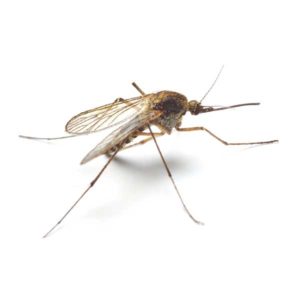Asian Tiger Mosquitoes
The Asian tiger mosquito is an invasive species known for its distinctive appearance and aggressive behavior.
Asian Tiger Mosquito Identification
What Do Asian Tiger Mosquitoes Look Like?
The Asian tiger mosquito is a small, striking insect, typically measuring about 2 to 10 millimeters in length. It is easily recognizable by its black and white striped body and legs, which give it its “tiger” moniker. The head and thorax have a single white stripe running down the center, distinguishing it from other mosquito species.
Signs of an Asian Tiger Mosquito Infestation
Their distinct black and white stripes make them relatively easy to spot. Their bites (which are red, itchy welts) often appear more inflamed than bites from other mosquito species. This species commonly breeds in small containers of stagnant water, such as birdbaths, plant saucers, and discarded tires.
Habitat, Diet, Life Cycle & Bites
Where Do Asian Tiger Mosquitoes Live?
Asian tiger mosquitoes thrive in urban, suburban, and rural environments, often near human habitation. They are most active in the warmer months and are likely found in areas with stagnant water, including gutters, buckets, flower pots, and other water-holding containers. They are adaptable and often like to rest in vegetation and shaded areas.
Diet
Similar to other mosquitoes, Asian tiger mosquitoes feed on nectar and plant juices. However, female mosquitoes require blood meals to develop their eggs, and they are known to bite humans, pets, and other animals to fulfill this need.
Life Cycle
The life cycle of the Asian tiger mosquito includes four stages: egg, larva, pupa, and adult. Females lay their eggs in small containers of water. The eggs hatch into larvae, which then develop into pupae before adulthood. Under optimal conditions, the entire life cycle can be completed in as little as a week.
Asian Tiger Mosquito Bites
Asian tiger mosquitoes are known to be particularly aggressive and their bites can be painful. They feed on a variety of hosts, including humans and animals. They are known for inflicting multiple bites during a blood meal and can cause significant itching and discomfort. They often attack during the daytime, unlike many other mosquito species that are more active during dusk and dawn.
Are Asian Tiger Mosquitoes Dangerous?
Yes, Asian tiger mosquitoes can be dangerous as they can spread several diseases. They are vectors for viruses such as dengue fever, chikungunya, and Zika virus. Their aggressive biting behavior increases the risk of disease transmission, making them a significant public health concern. Asian tiger mosquitoes can carry diseases, but not everyone infected will show symptoms. The severity of symptoms varies, ranging from mild to severe.
How to Get Rid of Asian Tiger Mosquitoes?
Controlling Asian tiger mosquitoes involves several strategies. Eliminating breeding sites is crucial; regularly empty and clean containers that can hold water, and ensure proper drainage around your property. Applying larvicides to water sources that cannot be drained will help kill larvae before they mature. Installing screens on windows and doors can prevent them from entering indoor spaces. Using EPA-approved insecticides can help reduce adult mosquito populations. Mosquitoes are a year-round threat in our region; the expert mosquito exterminators at Bug Out are committed to keeping you protected against infestations all year long!
Need help with Asian Tiger Mosquitoes control?
Asian Tiger Mosquito Prevention Tips
Preventing Asian tiger mosquito infestations requires proactive measures. It’s a good idea to wear protective clothing such as long sleeves and pants, especially during the day when these mosquitoes are most active. Use insect repellents containing DEET, picaridin, or oil of lemon eucalyptus for additional protection. Outdoor fans can also effectively keep mosquitoes away from patios and decks, as these insects are weak fliers.
Clean and empty outdoor containers that collect water regularly. Keep your yard free of debris where water can accumulate, and use larvicides in water features to prevent breeding.
For expert mosquito control solutions, contact your local Bug Out experts today!



